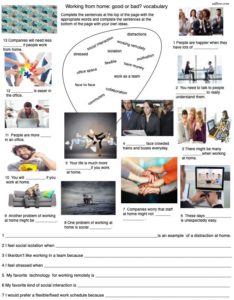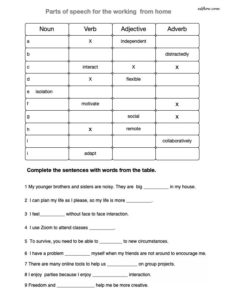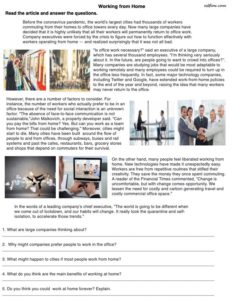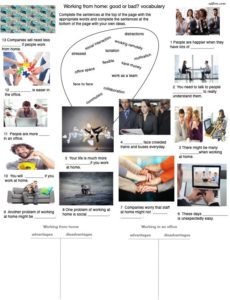Confinement means “the state of being kept inside or within borders,” and it comes from the verb confine, a word that has one of those Latin word origins that tells a satisfying story: it comes from confīnis «having a common boundary” or “contiguous,» ultimately from con- (“with, together, jointly”) and fīnis («boundary, limit, ending»)—also the root of the English word finish. So, literally, confine means something like “to stay within boundaries.”
Confinement has a faint whiff of punishment (think solitary confinement), but it was also used to refer to the period just before and after childbirth, when only medical personnel and close family could be in the room where a woman gives birth, a period of time also known as lying-in.
The noun is usually pluralized as confines, and like so many English noun/verb pairs, it is stressed on the first syllable /CON-fynz/ while the verb has second-syllable stress /con-FYNE/ (think of other pairs that are pronounced in two different ways, like record, rebel, and object).
The term screen time has a new meaning that has been superimposed on an older, existing term. Like mouse, cookie, lurk and browse, the era of the personal computer, the internet, and the smartphone has driven changes in our vocabulary. Old words, new meanings.
Originally, screen time referred to how much time an actor was visible during the course of a movie, presumably the source of contractual demands for more money by an actor’s agents, the jealousy of other performers, and the perception of stardom by the public. The term dates from 1921, the early part of the silent film era.
This has, of course, changed with the times: today, screen time refers to time spent with smaller, often very portable screens (especially compared with the silver screen). Although use of these devices is part of today’s professional, educational, and practical reality, keeping tabs on the amount of screen time devoted to purely recreational purposes has become a focus of both parenting and sometimes guilty self-awareness.
Using the attributes or activities of animals as metaphors is both a colorful and efficient use of language: think of squirreling away money, ferreting out the answer, horsing around, or bugging your family. The term empty nester refers to the way birds build their homes, and cocooning comes from the way some insects cover themselves in an envelope usually of silk as they transform from one stage of physical development to another.
In its sociological sense, cocooning means “the practice of spending leisure time at home in preference to going out,” and was coined with a sense of safety in mind:
In 1981, marketing strategist and trend spotter Faith Popcorn coined the term «cocooning.» Cocooning was the idea of staying home instead of going out, feeling safe and insulated from perceived danger. In a 1986 piece in The New Yorker magazine, she opined that the concept involves «building a ‘shell of safety’ around oneself.» The word is enshrined in multiple dictionaries.
—Lewis Walker, The Dunwoody Crier (Georgia), 24 March 2020
Indeed, this word has been in our dictionary since 1995, though only with the context of “leisure time” in its definition. We are now seeing a new sense for this word, as shown by its use in the official Irish governmental health recommendations:
Cocooning is a measure to protect those over 70 years or those extremely medically vulnerable by minimising interaction between them and others. This means that these people should not leave their homes. Even within their homes should minimise all non-essential contact with other members of their household.
The traditional medical meaning of fever dates to before the Norman Conquest, and cabin fever has been used to refer to a disease that had fever among its symptoms, typhus:
The certain consequence is the low typhus or cabin fever, which at all times, and at this present moment, exists in Ireland to a degree, that in any other country would create a serious alarm.
—The Gentleman’s Magazine, Volume 128, 1820
Using fever as a metaphor meaning “enthusiasm” or “craze” is much more recent, dating to the 1700s. This use was applied to the gold rush of the mid-1800s with gold fever. The bubble of prices for Dutch flowers during the mid-1600s was retrospectively referred to as tulip fever in the 1800s. There’s even evidence of cabin fever with this meaning—that is, “enthusiasm for building cabins”:
L. R. and P. W. Kyle got the cabin fever last summer. It’s very seldom these well known hustlers ever get away from their hardware store, but when they do, they wanted some where to go, so out at the Kyle farm on Rock Creek about five miles west of Erie, out even beyond Indian Hill, they built them last summer as elegant an abode as ever recreated the mortal part of man, and one which brings peace to the soul also.
—The Erie Record (Erie, KS), 14 May 1915
Of course, this is not how we understand cabin fever today. Somewhat surprisingly, the metaphorical use of fever that has a negative connotation (that is, one that is much closer to the literal use of fever) entered the language much later: cabin fever dates to the 1918 novel Cabin Fever by B. M. Bower, set in the American west. Cabin fever, as used in the novel, now means “extreme irritability and restlessness from living in isolation or a confined indoor area for a prolonged time,” and was first entered in our Collegiate Dictionary in 1973.
We have beachwear and townwear in English, which connect apparel and place (and perhaps appropriateness). There’s sportswear and skiwear and swimwear, which are connected with activities. There’s even outerwear and, of course, underwear, terms that describe the garments rather than their function. English also furnishes supremely practical terms like footwear and headwear, which identify the body parts covered by the named apparel.
Of all of these, perhaps only one has been used with reference to two very different etymological rationales: loungewear, which today means “informal clothing usually designed to be worn at home,” initially meant something else entirely.
In the late 1800s, clothes appropriate for wearing in a lounge would seem strikingly formal for us today. Back then, lounges were either synonymous with parlors or hotel lobbies, but in each case, these were spaces where more formal attire was expected.
The clothing worn in such spaces would be technically informal—but this was a time when “formal” specifically meant white tie and tails for gentlemen. This is why the term lounge suit is still used in British English to refer to what most of us would call a business suit today. In fact definition 1c of lounge in the Oxford English Dictionary is:
Elliptical for lounge-coat, -jacket, -suit
It’s clear that the lounge in lounge suit in this instance comes from the noun lounge, not from the verb meaning “to act or move idly or lazily,” a synonym of loaf. In fact, we can see that lounge wear was also used in this way, referring to relatively dressy clothes:
The members of each squadron are being measured for the jackets in their own localities by a visiting tailor from Aldershot. The coat is to be of easy fit, adaptable to lounge wear, and will be very acceptable to the force.
—Berrow’s Worcester Journal (Worcester, Eng.), 2 May 1896Those who still prefer (as I do myself) a perfectly plain, self-colored cravat for lounge wear have been appeased by some new brown crapes, which are even more beautiful in one than the foulards….
—The Washington Post, 3 Oct. 1904For business and lounge wear the only overcoat indorsed by good form this seasons is the plain long “Chesterfield.”
—Alfred Stephen Bryan, Detroit Free Press, 15 Oct. 1905
This original use of loungewear seems to have been missed by dictionaries; it’s found in neither the OED nor the massive and encyclopedic Webster’s Second edition of 1934. The loungewear we know today, of course, often pajamas or sweats, clearly derives not from the noun lounge but from its cousin, the verb.
The first recorded use of the term home office—referring to a governmental agency tasked with overseeing domestic affairs—is from Thomas Jefferson, from when he was Secretary of State, in 1790. In Britain, the term home office shortly thereafter was being used for a single department, one that doesn’t have an exact equivalent in the U.S. federal bureaucracy today.
The term later was used to refer to the headquarters of a business, dating back to 1840, according to the Oxford English Dictionary. This use is defined in our Unabridged dictionary:
: principal business location or base of operations : HEADQUARTERS
The most recent use of home office dates to the mid-20th century, but has been increasing in recent years. It’s a term that has perhaps never been more needed than during a period of enforced confinement during which many people must work from home if it’s possible for them to do so:
: a room in a person’s house where he or she does office work
Working from home can sometimes lead to putting things off. The time dividend from not commuting (or getting dressed) must allow us to do other things, right? Or to choose to avoid some things and not others? Or to watch just one episode, right now? Since I’m here?
At any rate, procrastinate is a term that comes to mind for many who suddenly work from home. It means “to put off intentionally the doing of something that should be done” and comes form the Latin word procrastinatus, a combination of pro- (“forward”) and crastinus (“of tomorrow”), so procrastinate literally means “having been put forward til tomorrow.”
We have other words that mean nearly the same thing, like defer or postpone, but none place the blame so entirely on the person responsible for choosing a later time to do something.
And there’s something about the way the word procrastinate is put together that makes it seem a bit malleable—that pro- is such a common compounding element, as well as the ending -ate, so often seen in verbs and adjectives formed from Latin words. Playful English speakers have created some clever variations, most of them delightfully self-explanatory, including:
procrastibaking
procrastimake
procrastinetflix
procrastinitis
procrastininja
There are also coinages based on procrastinate that are similarly transparent, like distractibaking.
The monosyllabic binge seems to be elemental and ancient. Indeed, one might think that it comes straight from the Anglo-Saxon language that forms the oldest part of English vocabulary—like the words hinge or twinge, which have just such an ancient history.
But English is nothing if not inconsistent: fringe is from French; tinge is from Latin.
It turns out that binge is a British dialectal word meaning “to soak” and didn’t come into use until the mid-1800s with the meaning we use today: “an unrestrained and often excessive indulgence.”
This word’s initial context, “a drunken revel,” refers to only one type of indulgence, but we all know there are others. The specific addiction of serial television created the need for a new term, binge-watch—now more useful than ever, given our habits with streaming, rather than waiting for scheduled showings like animals. It dates back to the late 1990s, and the early 2000s became known as a golden age of television when such shows as The Sopranos, Six Feet Under, and The Wire were watched, usually on DVD, in long sittings.

Business English vocabulary to use during meetings, especially when working from home.
Learn key phrases and expressions that will improve your communication at work and make you stand out.
- English level: upper intermediate & advanced / B2,C1 & C2
- English Skills: vocabulary, reading
- Time: 10 mins
please note: home working can be spelled in these ways: home working, homeworking and home-working!
Business English Vocabulary introduction
Read by Elisa
Last March during the coronavirus outbreak we were all thrown in at the deep end* and were told we had to stay home and work remotely.
I think some of us were initially excited at the prospect of working from home in our comfortable sweatpants, whereas others of us were left in utter* despair at the thought of meeting virtually and working from our living rooms.
A year on and here we are still getting to grips with* smart working, telecommuting, remote working or whatever other name you prefer to use for it.
Not only have we had to learn how to work from home and organise our days, but also a whole new vocabulary has come into our lives.
Therefore, this blog post is to help you with new words and phrases for remote working. We hope it will help you in communicating with your colleagues but also simply when speaking about your day with friends over a virtual coffee!
MINI GLOSSARY
thrown in at the deep end* = to make someone start a new and difficult job or activity without helping them or preparing them for it.
utter* (adj.) = complete, absolute
getting to grips with* = to begin to understand or deal with (something, such as a problem) in a direct or effective way
Business English vocabulary to use while home working:
The essential guide to the most common terms being used when remote working
We’ve split the guide into 4 categories:
- High frequency business English vocabulary around home–working
- Different ways to say “working from home”
- How to describe what it’s like working from home; routine and productivity
- How to discuss the challenges of working from home
1. High frequency business English vocabulary around home working due to COVID
Back-to-back meetings
This means that you have one meeting after another, so two or more consecutive meetings.
Example> ‘I’m exhausted after an afternoon of back-to-back meetings’
Beforehand
Beforehand means before an action or event.
Example> ‘Make sure you send out the agenda for our meeting beforehand’
Being on the cusp of
Being on the cusp of something means at the point when something is about to change to something else: on the verge of some beginning point or the start of some major development
Examples> ‘Our team is on the cusp of making a discovery that could change the face of modern medicine.’
‘Some companies are not quite on the cusp of changing to an agile organization’
Bogged down with
If you are bogged down with something you are so involved in trying to do something that may be difficult or complicated that you cannot do anything else.
Example> ‘‘I was so bogged down with work and learning how to work remotely that I barely noticed what my children were going through with online lessons.’’
Burnout
The experience of long-term exhaustion and diminished interest, especially in one’s career.
Let’s look at this headline from an article in WIRED for our example:

“Companies are finally starting to take staff burnout seriously
As the workforce navigates ongoing uncertainty through England’s second lockdown, businesses are going to new lengths to stave off employee exhaustion”
We can see that burnout is a very real problem in 2021!
Going to new lengths & stave off
Going to new lengths is a great expression to use to mean that you try very hard and perhaps do extreme things in order to achieve something.
Whereas, stave off is a phrasal verb meaning to defend against or keep someone or something at bay; to delay something
Checking in
Checking in is when you contact your colleagues via zoom or teams for example to see how things are going.
Example> ‘‘Hi Sarah, just checking in to see how you are and how you are getting on with your latest project’
Clear cut
Something is clear cut when it is clear or obvious without needing any proof.
Example> ‘There is no clear-cut evidence that the new variant of coronavirus – which has been detected in south-east England – is able to transmit more easily, cause more serious symptoms or render the vaccine useless’
Cut corners
You are cutting corners if you are trying to save time and money: do something in the easiest or least expensive way; it can also mean to act illegally.
Example> ‘Risk management is no place to cut corners during a pandemic’
Furlough
Furlough is when an employee is asked to take temporary leave and the government pays up to 80% of the employees salary during this time.
Example> ‘The scheme was due to finish at the end of April, but the sectors that rely most on furlough would not be fully open by then.’
Let’s see this business English vocabulary example from BBC NEWS

Move back
If someone asks you to move back a meeting it means to move it further away from the current time. So if the meeting was scheduled at 9am and someone asks you to move it back an hour then you would reschedule for 10am.
Example> ‘I’m really sorry but can we move back our 11am meeting tomorrow, let’s say by an hour? So midday, would that work for you?’
Navigate uncertainty
When you navigate uncertainty you are trying to move forward and steer a course during an uncertain period or state of being.
Example> ‘Everyone has been navigating uncertainty during the pandemic and this often causes a great deal of stress’
Nitty gritty
The most important aspects or practical details of a subject or situation.
Example> ‘Let’s get down to the nitty gritty and discuss how we are going to manage the situation’
Ongoing
Ongoing means continuing or still in progress.
Example> ‘The ongoing world health crisis is having a great effect on our mental health.’
Rule of thumb
Rule of thumb is a way of judging a situation or condition based more on experience than on what is exact: a broadly accurate guide or principle, based on practice rather than theory.
Let’s look at this headline from an article in govexec.com for our example:

Rule out
To rule out means to exclude and therefore to dismiss from consideration.
Examples>
‘I wouldn’t rule it out before trying’
‘Mr Hancock’s comments suggest he is ruling out a “zero Covid” strategy, aimed at eliminating the virus entirely from the UK.’
Sidetracked
When you are sidetracked your attention is directed away from an activity or subject towards another one which may be of less importance.
Examples>
‘Students often get sidetracked by messing around with filters during zoom lessons’
‘Sorry I’m late I got sidetracked, working from home I find myself hanging out the washing and preparing dinner in between calls.’
Take a step back
To take a step back means to stop being involved in something or to temporarily stop being involved in order to look at it from a different perspective.
Examples>
‘I took a step back to reflect on what direction I wanted my life to take’
Let’s look at this headline from an article in Welcome to the Jungle for another example:

Workaround
Workaround means to find a way to overcome or avoid a difficulty or problem
Example> ‘You need to find a way to workaround your differences with your colleague, it’s so hard to work well together if you are constantly competing and judging one another.’
You might be interested in this post

2. Business English vocabulary: ways to say «working from home»
Do your job remotely
Example>
‘Doing your job remotely gives you the chance to be wherever you like.’
Digital nomad
Digital nomad refers to individuals who work remotely using information and communications technology. If you are a digital nomad it means you work remotely but in a nomadic manner so perhaps by changing city, town or country frequently.
Example>
‘I would love to become a digital nomad, changing city or even country every few months.’
‘During the pandemic we have been working remotely however it has been almost impossible to become a digital nomad due to the travel restrictions.’
Smart-working
Smart-working (or agile working) is a well-known business English vocabulary term and it consists of ways of working that make it intelligent. Therefore it should limit frustration and stress to the maximum to bring out better results and quality of life.
Example> ‘Smart-working is supposed to be a more intelligent way of working. However, not done properly, it can have a great impact on our mental health as we isolate ourselves at home.’
Telecommute
Example> ‘Some companies had already started allowing some employees to telecommute before the pandemic’
Work from anywhere
Example> ‘Working from anywhere means freedom as far as I’m concerned, I don’t like being stuck in one place for too long.’
Work virtually
Example> ‘Working virtually can be tough if you have a family at home!’
To be part of a virtual team
If you are part of a virtual team it means you are not working alone but as part of a team that you communicate with daily through virtual platforms such as Zoom, Skype, Teams and so on.
Example> ‘Being part of a virtual team is great and definitely better than working alone. However it’s not quite the same as being in an office all together’
You might be interested in this business English vocabulary course

- Do you ever find yourself in an online meeting and suddenly something goes wrong?
- Do you feel frustrated or even panic a little because you don’t know what is the right thing to say in English?
Don’t worry! With the words and expressions you will learn in this course, you’ll be ready to deal with these situations naturally and proactively.
3. How to describe what it’s like working from home; routine and productivity
Break up your day
Break up your day means to make sure you take some breaks in between work.
Example> ‘I try to break up my day by taking a 10 minute coffee break in the morning and one in the afternoon. I also try to go out for a walk during my lunch break!’
Brainwork
Work or effort consisting mainly of mental activity and thought.
Example> ‘Nowadays a large number of people engage in brainwork and lack adequate physical movement.’
Brain fog
Brain fog is the inability to have a sharp memory or to lack sharp focus. You may feel confused, disorganised or find it hard to focus on anything.
Example> ‘Some people call it pandemic fatigue, others call it brain fog or “COVID brain’
Let’s look at this headline from an article in The Irish Times for another example:

Create a morning routine
Working from home can become monotonous, waking up and before you even have time to change out of your nightwear into your favourite loungewear , you are already sat at your computer perhaps only 10 metres away from where you just got out of bed.
It’s important to create a morning routine such as waking up, having breakfast and then heading out for an early morning walk before starting work.
Example> ‘A few months into remote working I realised that I was starting to feel down and I needed to change something. I created a morning routine, up at 7am, breakfast and then a 30 minute walk before sitting down at my desk. It’s really made a difference and I’m feeling myself again.’
Create time to unwind
Creating time to unwind is so important at the end of a working day. It means finding the time to forget about work and what has happened today, what you have to do tomorrow and most importantly RELAX! Maybe you unwind with a glass of your favourite red wine, watching a tv series that you love or having a hot bath!
Example> ‘I always create time to unwind in the evening after work, I love lighting some candles and just relaxing on the sofa with a good book and a glass of wine.’
End your day with a routine
This is similar to starting your day with a morning routine, sometimes it’s really good to end your working day with a routine! It could be going for a run or doing an online yoga class or quite simply switching off your computer and reflecting on your day and all the positive things you’ve done!
Example>
‘I like to end my day with a routine by switching off my computer and putting it somewhere out of sight, I just take 5 minutes to reflect on the working day that has passed and then I enjoy catching up with my husband as we prepare dinner..it’s really nice to share stories about our days and maybe have a laugh about all the not-so-positive things that have happened!’
Flexibility
Flexibility is the ability to adapt to changes and the willingness to change or compromise.
Example> ‘Remote working offers us a great deal of flexibility, I can organise my days as I please and around all the other things I have to do! Some days I start earlier in the morning so that I can finish earlier in order to spend the afternoon with my kids when they get back from school! If I were working from the office like before I wouldn’t have this precious family time.’
Maintain regular hours
Maintaining regular hours means to not end up working extra hours, which is very easily done when working from home. Remote working can lead to the idea that we are always available and that working hours have no limits.
Example> ‘I’m really trying to maintain regular hours, I’ve set a starting time in the morning and finishing time in the evening and I stick to them! I also make sure I take a proper lunch break.’
Keep a dedicated workspace
Make sure you have a room or part of your house that is for working, create an environment to work well in. If possible try to keep your dedicated workspace separate from the rest of the house or living areas.
Example>‘It’s hard to keep a dedicated workspace when living in a small flat in the city centre.’
Set Ground Rules
(with people in your space / your team)
To set ground rules means to set basic principles on which future behaviour is based. Ground rules are really important, they can prevent future issues and incorrect behaviour.
Example> ‘At the beginning of lockdown, I asked my team to each propose one ground rule for remote working.’
Schedule breaks
Scheduling breaks means to plan your breaks for the day in order to not get caught up in work and forget to take a breather or have some lunch.
Example> ‘I’ve scheduled 3 breaks during my working day, a 10 minute coffee break in the morning, one hour at lunchtime so that I have time to eat and maybe take a short walk, the another 10 minute break in the afternoon.’
Take advantage of your perks
To take advantage of your perks means to make the most of the benefits that you are given by your company.
Example> ‘A lot of my friends are taking advantage of their company perks during the pandemic. Some have been given food vouchers for grocery shopping while others have received extra money for child care.’
Thrive at work
To thrive at work means to prosper or flourish; to grow, develop or become successful.
Example> ‘I think it’s really hard to thrive at work at the moment, working from home. Plus companies struggling economically due to the pandemic are all reasons that climbing the career ladder at the moment seems like a distant dream.’
Let’s look at this business English vocab example from BBC Worklife

Share this article!

4. Business English Vocabulary: how to discuss the challenges of working from home
‘Always-on’ work culture / Overworking
Always-on work culture means never really switching off from work and being constantly available. Overworking is very similar as it means to be working too much or more than you should be.
Example> ‘Smart working has led to a rise in always-on culture as it seems that we are always available through our electronic devices. We need to put our foot down and remember to switch off…in every sense!’
Bad health habits
Bad health habits are a negative behaviour pattern towards our health, so perhaps poor diet, little or no exercise or even bad sleeping patterns.
Example> ‘Many people who are now remote working have developed bad health habits, with gyms being closed and working from home, it’s easy to slip into a sedentary lifestyle and unhealthy food can often provide comfort during moments of despair.’
Communication Issues and Being Out of the Loop
Communication issues are problems in communicating and perhaps misunderstanding communication.
Being/feeling out of the loop means to be unaware of some information about a particular matter. This can lead to feeling excluded.
Example> ‘Working from home has left many of us feeling out of the loop, finding out about a zoom call that we weren’t invited to has started to feel like when we didn’t get invited to a party as a teenager.’
Let’s look at this headline from The Independent

Difficulty to find work/life balance
To have blurred lines between personal/professional life
To feel/to be burned out
To feel or be burned out is when you are exhausted and demotivated especially with your job.
Example>
‘Around 6 months of smart working I was starting to feel burned out, I was so tired and lacked interest in anything I was doing.’
Check out this article from Forbes

Loneliness and lack of human interaction
/ to feel cut off/
closed off from the world / social isolation
- loneliness and lack of human interaction
- to feel cut off
- closed off from the world
- social isolation
These are all expressions that we use to express the idea of being socially isolated and lonely.
Examples>
‘Last March at the start of the first lockdown I felt really cut off from the world, I left my house once a week just to go to the supermarket and after one month my mental health was crumbling.’
‘Social isolation is a great concern for us all at the moment and the more we are socially isolated the more difficult it will become to return to normality.’
Interruptions
Interruptions are when something or someone stops you from doing something for a short period of time.
Example> ‘Constant interruptions are standard since starting remote working and I find it really hard to get back on track’
Prioritising work
Prioritising work is putting it in order of importance and deciding to do what is more important first.
Example> ‘I need to improve in prioritising work, I find it hard deciding what is more important/urgent at the time.’
Technology hiccups
Technology hiccups are when a problem for example with you computer or telephone causes a delay or interrupts something for a while.
Example>‘Sorry I’m late for the meeting but I had a technology hiccup, my laptop froze on me and I had to restart it.’
To steal a few minutes to do something
To steal a few minutes means to set aside or reserve a small amount of time to do something.
Example> ‘I managed to steal a few minutes for a catch up with an old friend that I hadn’t heard from for years.’
To stay on track
Staying on track means to stay focused on what you are doing and continue making progress as planned or expected.
Example> ‘Staying home during the pandemic has made it difficult to stay on track with exercise and healthy eating.’
To shut out the world
If you shut out the world it means to prevent the world from entering your personal space therefore your mind: you don’t allow what’s happening in the world into your mind and therefore not affect your state of mind, mood etc.
Example> ‘I found the only way to stay positive was to shut out the world so I stopped reading the news and catching up with people for a few weeks as the only thing everyone was talking about was the virus.’
BUSINESS ENGLISH ONLINE COURSE
Essential language for online meetings

Conclusion
We hope you’ve found this business English vocabulary lesson useful! It’s impossible to cover every word or expression that you may be hearing when it comes to home-working. This guide is intended to give you the essentials; to help you talk about remote working with a rich advanced English vocabulary.
If you have any questions about the vocabulary above or if you’ve come across any other words or expressions that you haven’t understood, leave us a comment below.
Lastly, please share with anyone you think may benefit from this article!
Stay well and stay safe!

 ‘You’re on mute!’
‘You’re on mute!’
For those of us not on the frontline, and who are lucky enough to be able to continue working almost ‘as normal’, WFH (working from home) has been turned on its head. It seems to be stating the obvious when someone’s email signature includes ‘I’m working from home’. Our example sentence ‘I usually WFH on Fridays’, reminds me that this concept seemed like a novelty a year ago, something you’d have to apply for special dispensation for and have some sort of valid reason to justify.
In fact, ‘I’m actually in the office’ would be more surprising nowadays, and the very thought of returning and seeing so many people in such a confined space makes me shudder.
In German-speaking countries, the ‘Homeoffice’ is a topic of everyday conversation. This is completely logical, but confuses me every time, because I instinctively hear it as ‘the Home Office’ (the British government department). It’s another of the many instances, like ‘smart working’ in Italy, in which countries with different mother tongues are using English perfectly accurately, but in a different way and with a completely different grammar (‘Ich mache Homeoffice’ = literally ‘I do homeoffice’). It was a contender for Germany’s ‘Anglicism of the Year’ in 2020, pipped at the post by ‘Lockdown’, which often appears as a compound noun – something the German language excels at – such as ‘Lockdown-Lockerungen’ (easing of the lockdown).
As I write this, the UK lockdown is still in full force. I’m wrapped up in my poncho and with a hot water bottle so as not to add to the climate crisis by putting my heating on. I have a makeshift standing desk in my spare room and instead of enjoying the antics of the OUP ducks at our Oxford office, I’m witnessing the neighbour’s tree spring into action and passers-by doing their best to be socially* (or at least physically) distanced*.
Gen Z seemed largely unphased by the abrupt move to virtual working environments, gently reminding the less tech-savvy of us to unmute* and coping well with the lack of in-person meetings. Their versatility in the face of huge change is one of many aspects of our ‘new normal’ to celebrate. Our reduced footprint from less commuting and travel (the anthropause?), slowing down our pace of life and focusing on the really important things – spending time in nature and thinking of novel ways to see our loved ones (Zoom quiz with Grandma, anyone?). In the cold, bleak winter months, when mental health issues are constantly bubbling up, these are things to cherish. So I wish you (and your support bubble*) strength and patience, whether WFH, remote learning*, on the frontline, avoiding superspreaders, practising mindfulness or receiving your vaccination!
*These new words will be added in the next update to Oxford Learner’s Dictionaries online!
Isabel Tate is a Senior Editor in OUP’s Dictionaries and Reference Grammar department. Currently WFH, she’s looking forward to a time when she can elbump her Homeoffice friends across the globe!
Other than homeworkers (which is vague), freelancers (which is, to my knowledge, US-specific, and non-exclusive to this), what other words do self-employed people working from home describe themselves, that are uniquely highlighting these features of their working condition?
RegDwigнt
96.4k39 gold badges305 silver badges399 bronze badges
asked Jan 9, 2013 at 7:07
2
In the US we refer to them as telecommuters.
A freelancer is an entirely separate thing.
I would expect these terms to carry over to the UK.
answered Jan 9, 2013 at 7:13
JimJim
33.2k10 gold badges74 silver badges126 bronze badges
8
The term homeworker is indeed used in the UK.
It is not the same as homemaker, which can be used for someone who stays at home but does not work for an employer (and who might be called a housewife). A homeworker is understood to be working for an employer from home.
answered Jan 9, 2013 at 7:56
Andrew Leach♦Andrew Leach
98.4k12 gold badges188 silver badges306 bronze badges
The term homeworker is only vague in the context you wish to use it in because it means someone who works from home. That person may or may not be self-employed.
The term freelancer is inappropriate in your context because whilst normally they would be self-employed it refers to someone who is hired for work on an ad hoc basis and they may or may not work from home.
The only phrase that meets both your requirements of self-employed and someone who works from home is self-employed homeworker.
There is an acronym, SOHO that refers to small office/home office but is generally used to differentiate market segments rather than refer to individual people. You could within the right context use self-employed SOHO worker or workers.
answered Jan 9, 2013 at 13:15
spiceyokookospiceyokooko
2,4991 gold badge16 silver badges18 bronze badges
While telecommuter is used in the UK, I have also seen the use of teleworker.
answered Jan 9, 2013 at 7:32
coleopteristcoleopterist
30.7k28 gold badges114 silver badges199 bronze badges
I think the word home should be avoided as it lowers the credibility
External Executive or Outsourced Partner, came up to my mind
answered Jan 9, 2013 at 17:47
1
I describe myself as a «home-based worker» in this context. I am also, as it happens, a freelancer, but as others have pointed out, the two things are orthogonal: you can be an employed home-based worker or homeworker, and you can be a freelancer who attends a regular place of work (in some cases your own office, in other cases clients’ premises).
And yes, «freelancer» is in regular use in the UK.
answered Jan 11, 2013 at 6:43
“Working from home” is a great topic for English language classes. In the current circumstances nearly everyone has some experience of working from home. So it’s a great discussion topic, and it could also used for classes involving giving opinions, making comparisons (home vs office), teaching argumentative writing or discussing technological change. It also has its own fairly specific set of vocabulary.
1 Working from home vocabulary ( with audio and answers)
Working from home uses some a fairly specific and often repeated set of words. So it makes sense to teach these words business English language students as these words increasingly appear in the media, in writing and in everyday conversations.

Working from vocabulary (PDF)
(see the video version on YouTube)
Subscribe to Eslflow
Subscribe to get full access to the latest and best resources from eslflow.com. There are no ads in the newsletter and you will receive entertaining, high quality, and up-to-date teaching resources regularly. And, if you subscribe, you will be supporting the eslflow website.
2 Working from home parts of speech
Working from home uses some a fairly specific and often repeated set of words. So it makes sense to teach these words business English language students as these words increasingly appear in the media, in writing and in everyday conversations.

Working from home parts of speech (PDF)
Related Resources
4 Worksheets Expanding Business English Vocabulary and Speaking Skills
4 Money and Finance Vocabulary and Speaking Worksheets
Business English Home
12 Business English Speaking and Language Skills Exercises
5 Cool Advertising & Branding Vocabulary & Language Exercises
5 Describing Graphs Vocabulary and Language Exercises
Coronavirus vocabulary and language exercises
3 Working from home reading comprehension
The movement to “working from home” affects so many aspects of people’s lives. Consequently, it is a great topic for teaching any aspect of the English language as it is likely to engage students interest.

Working from reading comprehension (PDF)
4 Working from home vocabulary (brainstorming and argument version)
This is such a good topic for discussions, arguments and debates that I made a second version (of exercise 1) with charts at the bottom for brainstorming the advantages and disadvantages of working from home versus working in the office.

Working from home vocabulary for brainstorming (PDF)
Related Resources
15 Classroom Debate and Discussion Language and Critical Thinking Activities
10 Essential Opinion and Argument Writing Templates and Worksheets
6 ESL Exercises and Worksheets for Talking about Cities
15 Captivating Computing, Technology and Innovation Vocabulary and Language Exercises









 ‘You’re on mute!’
‘You’re on mute!’